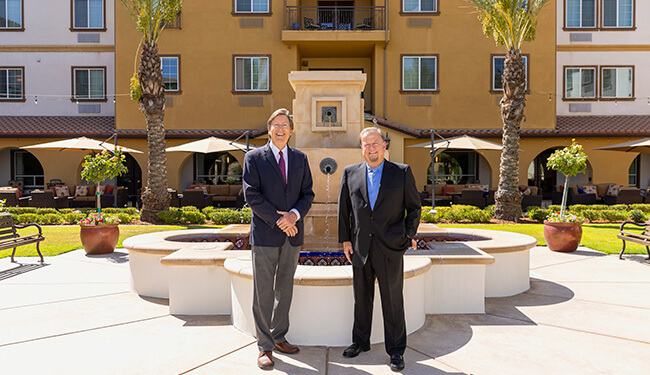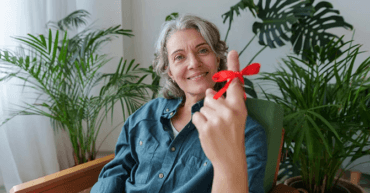October 3, 2024
MINDFUL: Interview with Dr. Bredesen and The Vineyards’ Dennis Bacopulos

Photos courtesy of SVLUX’s Don Dizon
CVLUX Magazine’s Lauren Barisic spoke with Dr. Dale Bredesen and Dennis Bacopulos, CEO of The Vineyards, about developing a one-of-a-kind Center for Cognitive Excellence at the assisted living facility in Fresno CA. For your convenience, please find the full article below.
Something significant is unfolding for memory care in the Central Valley. The Center for Cognitive Excellence at The Vineyards | California Armenian Home will be the first of its kind, not only in the region but also in the nation. At its core are the research and protocols developed by Apollo Health’s Dr. Dale E. Bredesen, MD, an expert in neurodegenerative diseases. His Bredesen Seven (B7) approach is transforming the treatment and prevention of cognitive decline, offering revolutionary solutions for individuals of all ages. With this exceptional facility providing cutting-edge practices right in the heart of California, world-class cognitive treatment is now within reach.
The prevalence of illnesses and medical practices has changed dramatically over time. In the 19th century, Dr. Bredesen explains, “We had the notion in medicine that when you would get sick, you would go to your doctor,” Dr. Bredesen outlines. “The doctor would make a diagnosis, and then would write a prescription or would take you to surgery. Those were basically the options, and that worked very well for 20th-century diseases like pneumococcal pneumonia, tuberculosis, and even for HIV.” However, the “simple” illnesses of the past are no longer the leading causes of death. “Now, almost all of us are dying of complex chronic illness,” Dr. Bredesen reveals, citing neurodegenerative diseases, cardiovascular diseases, cancers, and kidney failure as common culprits. “These are fundamentally different.”

Complex diseases involve network dysfunctions. Typical treatment plans often focus on prescriptions, states Dr. Bredesen, “But the prescription has nothing to do with what actually caused the problem.” This is where his approach diverges from conventional methods. “We have these beautiful networks in our nervous systems and elsewhere that subserve different functions,” he elaborates. “Whereas the old question — that we learned in medical school — was, ‘What is it?’ and you got to be a good diagnostician, now we have to say, ‘Why is it?’ That’s the fundamental difference between ‘what is it’ and ‘why is it.’”
Dr. Bredesen points out that throughout human evolution, we have selected mates for performance rather than durability. “We end up with these incredibly functioning nervous systems, but not much durability, and so little things knock them out.” The human brain can store the equivalent of 2,000 home computers. “When that goes awry, when your supply is exceeded by the demand, you have to shrink,” resulting in conditions such as Parkinson’s and ALS.
“We did 30 years in the lab, looking at the molecular biology of how and what drives us, what are the actual molecules. And then when we could see these things are networks, and we’ve got to identify the networks, and we’ve got to optimize the networks. Then we translated that into, ‘What would a human being do to prevent and treat?’ And we were excited because the first few people I saw got better, and I was like, ‘Okay, for the first time in history, we can actually do this,’” he asserts.“Everything I was taught was, ‘We don’t know what causes Alzheimer’s.’” Contrary to the prevailing belief that nothing can prevent, reverse, or delay Alzheimer’s, “What we found is actually there’s a lot of stuff we can do! In fact, you’ve got a whole armamentarium now, and it has to do with all the things that move the needle in that network.”
Dr. Bredesen’s books, The End of Alzheimer’s and its follow-up, The End of Alzheimer’s Program, educate a wide audience about his innovative strategies for preventing and reversing memory-related diseases. These books serve as the foundation for how The Vineyards is establishing the Center for Cognitive Excellence. Dr. Bredesen’s B7 strategy is already being implemented at The Vineyards campus in Fresno, making it the first facility to adopt his complete program.
The B7 approach encompasses nutrition, exercise, sleep, stress management, cognitive stimulation, detoxification, and supplements. Those are called the “basics.” They are addressed alongside the “specifics.” For instance, Dr. Bredesen asks, “Do you have a specific infection that hasn’t been noticed? Do you have sleep apnea which hasn’t been diagnosed? Do you have toxicity from mercury, from pesticides, from eating bad food, that sort of thing. All these factors can contribute. You take the basics and fix those and then you take the specifics and address those, which is why we call it precision medicine. Then, you get the best outcomes in history. And we’ve had the best outcomes that have ever been seen.”
The Vineyards is one of three facilities currently adopting Dr. Bredesen’s research and methodologies, alongside Marama in San Diego and the Clear Mind Center in Kansas. He hopes that the positive results will speak for themselves, encouraging people to seek out facilities that can truly make a difference. Unfortunately, “We give prescriptions that really don’t work. We tell people, ‘There’s nothing that can be done and we don’t know what caused it,’ when we do understand much better what causes the problem,” Dr. Bredesen asserts.
Too often with individuals showing early signs of dementia, “We send them to assisted living facilities that are just making them go downhill,” notes the doctor. It’s not uncommon to hear of a loved one who was declining slowly suddenly get drastically worse once moving into a memory care. “What we should be doing is now treating them better, understanding what’s going on, and actually beginning to get them well and, at the very least, keeping them so they don’t go down any further. That’s the future—the future will be precision medicine,” he insists. This involves integrating protocols, examining the factors driving the condition, and using targeted treatments to address the root cause rather than just the symptoms.
“This is a fundamental change in the way medicine is practiced, and, unfortunately, it has not found its way into mainstream medicine yet,” Dr. Bredesen acknowledges. “We are the 31st country in the world in our longevity, but we’re the first in what we pay for longevity.” This makes the emergence of groundbreaking medical advancements in the heart of the Central Valley so exciting. The Center for Cognitive Excellence will be located on The Vineyards | California Armenian Home, which has significantly expanded since its opening in 1958, originally situated on what was once 40 acres of Muscat grape groves, from which its name is derived. It has evolved into a lifestyle-driven hospitality model that prioritizes lifelong learning, health and wellness, and culinary experiences, making this partnership ideally aligned.
After learning about Dr. Bredesen’s work, Dennis Bacopulos, Chief Executive Officer at The Vineyards | California Armenian Home, felt compelled to reach out. “I got the Apollo Health number and called and just basically said, ‘Hey, Dr. Bredesen wants to change the world. We’re a mission-driven non-profit that has served seniors for [almost] 70 years, and we want to be part of this. We want to do everything we can to take these lessons that he has not just compressed but articulated in both of the books.’ Our board was very happy to embrace this mission.” “This is why I’m so excited about The Vineyards, because they are open-minded enough and visionary enough to see what’s coming,” Dr. Bredesen praises.
Naming it the Center for Cognitive Excellence shifts the focus away from the negative connotations associated with the idea of “memory care” while acknowledging that not all neurological issues should be grouped under a single umbrella. “We’ve learned that as an industry, we have little to offer to residents that are suffering from cognitive decline,” admits Dennis. “The moment folks would start to show some early signs of dementia, it would all get lumped together. … This is not us — this is the industry,” he clarifies. “If you had dementia, Alzheimer’s—most people don’t distinguish the difference.”
The first building will focus on what’s being termed “Assisted Living Plus,” providing an interim step before individuals require full assistance. “The first phase of that is the expansion of our memory care in two ways,” Dennis details. “One, it’s now been officially renamed. The sign will change — it’s going to be ‘cognitive care’ because ‘memory care’ is not what people perceive as positive.” This will add an additional 20 rooms at The Vineyards.
Then there’s a new building, which is currently in the fundraising stage. “We have planned the first building that we’re going to build along with the Phase One expansion, and it will be the Center for Cognitive Excellence,” Dennis continues. “It’ll have a health and wellness center that’s 100% dedicated to this program and the protocols,” referring to Dr. Bredesen’s work. The doctor recently began working with his first cohort group of about 15 residents and board members at The Vineyards. “We want to have a building that its entire ethos is focused on these protocols and programs,” says Dennis.
Beyond the physical facility, individuals can access a DIY version of the B7 protocol online. Those over the age of 30 can also utilize BrainScan, a revolutionary blood test offered by Apollo Health in collaboration with their partner Neurocode, which can detect the earliest stages of dementia years before symptoms manifest.
The Center for Cognitive Excellence relies on the generosity of donors to help turn this vision into reality. This is the goal of VISION 2023 — to raise $30 million by 2030. Supporting this initiative is a mindful step toward ensuring the memory health of current and future generations. “The more we get the word out, we feel like that’s part of our mission,” Dennis believes. The future of medicine is right here in the heart of the Golden State.




